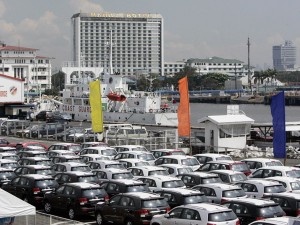
STILL UPBEAT Hundreds of imported cars mostly from Japan and South Korea are parked waiting for deliveries at a Manila pier on Nov. 10, 2011. Businesses in the country remain optimistic about their ability to generate profit and the performance of the overall economy in the fourth quarter, according to the Bangko Sentral ng Pilipinas’ latest survey. AP Photo/Pat Roque
Businesses in the country remain optimistic about their ability to generate profit and the performance of the overall economy in the fourth quarter, results of the Bangko Sentral ng Pilipinas’ latest survey showed.
In the Business Expectation Survey (BES) for the fourth quarter, the business confidence index for the period settled at +38.7 percent.
The index settles in positive territory when respondents who say they are optimistic about their prospects outnumber those who say otherwise.
According to BSP Deputy Governor Diwa Guinigundo, a positive index tends to support expectations that growth of the economy will accelerate from the 4 percent reported in the first half of the year.
Businessmen’s positive sentiment normally translates to an increase in investments, he explained.
The index for the fourth quarter was higher than the +34.1 percent reported in the third quarter. But it was lower than the +50.6 percent seen the fourth quarter of last year.
Teresita Deveza, acting deputy director for the central bank’s department of economic statistics, said Thursday that the year-on-year increase in the confidence index was due to a rise in demand expected of the holidays, the sustained growth in remittances that fuel household consumption, the anticipation of higher government spending, and expected rise in public infrastructure investments.
“The more buoyant outlook was broad-based, as it was seen almost across all business sectors,” Deveza said in a press conference.
Also, the year-on-year decline in the business confidence index was said to be caused by developments abroad. In particular, the debt crisis in the eurozone, as well as the weak performance of the US economy, has been weighing down on Philippine exports.
The continuing tension in parts of the Middle East and North Africa, the downgrade of the US credit rating, as well as the natural disasters in Japan, likewise dampened outlook of businesses this year compared with that of last year.
“The global situation this year has deteriorated relative to that in 2010. Our GDP [gross domestic product] was very high in 2010, and the economy was very resilient and promising then. Starting the first quarter of 2011, however, we have seen a lot of bad news,” Guinigundo said in the same conference.
Nonetheless, favorable indicators on the domestic economy have kept the overall business sentiment in the country from sliding to negative territory, Guinigundo said.
These factors include manageable inflation, the relative growth of the economy, and traders’ increased access to credit.